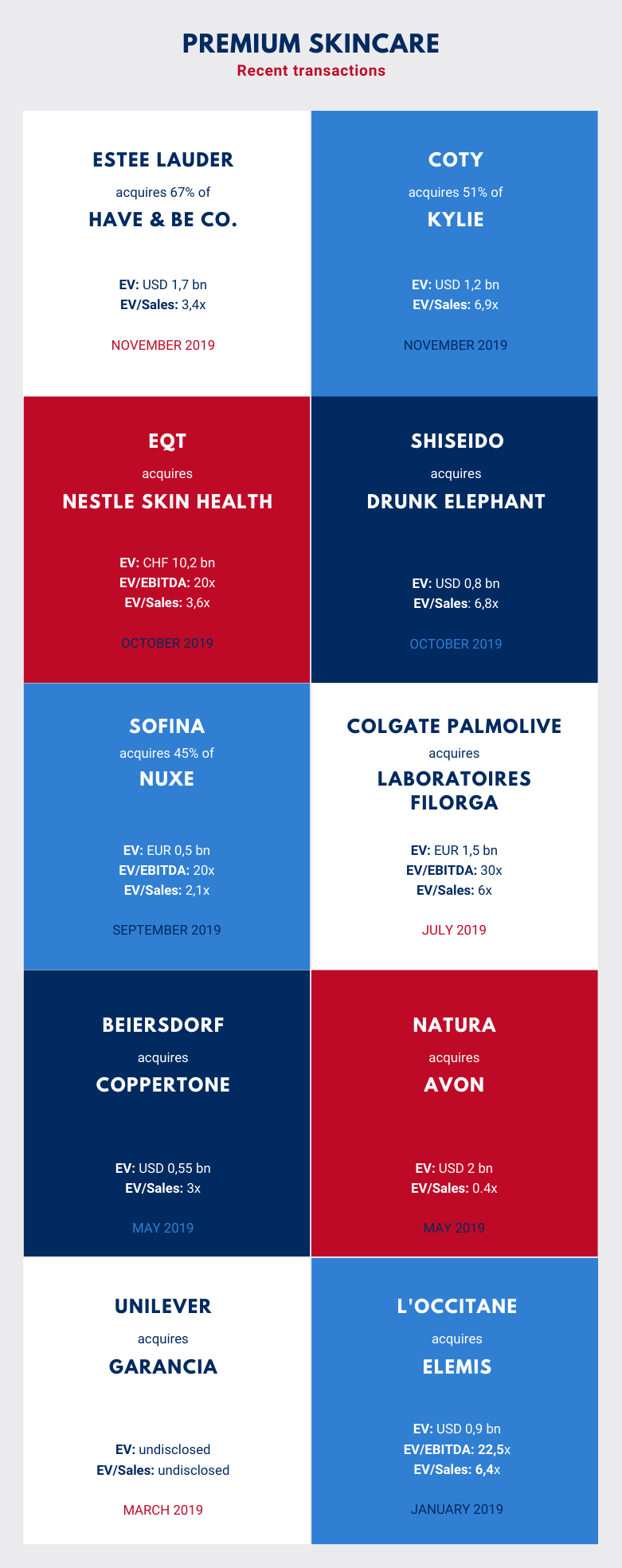- Home
- News & Insights
- Big moves in skincare
Big moves in skincare
It was a banner year for beauty deals in 2019, as strategic investors and others looked to bring new brands and innovations in-house. Premium skincare, in particular, attracted a wide range of buyers:
- led by the beauty giants, who secured several innovative high-growth brands – eg. acquisitions by Coty (Kylie), Estee Lauder (Have and Be) and Shisiedo (Drunk Elephant);
- personal care corporates, attracted by the high margins and growth trends (Colgate-Palmolive acquired Filorga, and Unilever acquired Tatcha and Garancia);
- fragrance players, who widened their strategic focus (L’Occitane acquired Elemis);
- and financial investors, who also ramped up investments (EQT acquired Nestle Skin Health, Sofina invested in Nuxe).
In 2020, we expect private equity and strategic investor enthusiasm to persist. Popular product categories include skincare brands with proven scientific efficacy, sustainability credentials, and young customer bases. Haircare is also popular.
The beauty giants are seeking high-growth brands that access strategically important consumer demographics, while the personal-care corporates are looking to expand their beauty and skincare portfolios. For example, Unilever has become a serial acquirer, highlighted by the Tatcha and Garancia deals. (Acquisitions account for the main share of growth within Unilever’s skincare portfolio, which includes Murad, Dermalogica, REN Clean Skincare, Kate Somerville, Living Proof, and Hourglass.) Likewise, Colgate Palmolive is finally engaging in focused acquisitions in skincare to grow its beauty portfolio and develop outside oral care.
Private equity investments are on the rise in beauty and skincare. These savvy financial investors are attracted by the high gross margins, repeat purchase trends, alternative sales channels, and the large international markets that provide additional runways for growth. Private equity was responsible for almost half of the deal activity in the Beauty sector in 2019.

- The Swedish private equity firm EQT Partners (a subsidiary of the Abu Dhabi Investment Authority) led a consortium to acquire Nestle’s non-core ‘skin health’ business (rev: $2.7bn) in a deal reportedly worth $10bn. This transaction followed a fiercely competitive sales process in which private equity firms KKR, Advent International and Cinven were other high-profile suitors, as were Unilever and Colgate-Palmolive.
- Premium natural cosmetics specialist L’Occitane International acquired the luxury skincare company Elemis (UK; 2018 rev: $140m) for $900m. Elemis is the leading independent British skincare brand, one with strong cross-generational consumer appeal, including the millennial demographic, but has been working to establish itself in new channels and geographies.
- Coty acquired a majority 51% stake in Kylie Cosmetics (US; 2018 rev: $170m) for $600m. Kylie Cosmetics was founded by the 22-year-old ‘mega-influencer’ Kylie Jenner, who has no less than 163 million followers on Instagram. The deal makes Coty the first major strategic beauty company to buy into the influencer life. Coty plans to expand the brand geographically and into new beauty categories.
- The German consumer goods group Beiersdorf (owner of Nivea) acquired the sun-care brand Coppertone (US; 2018 rev: $213m) for $550m. The deal strengthens Beiersdorf’s position in North America and “adds complementary expertise to its brand portfolio”. The company is actively seeking acquisitions and sitting on a cash pile of more than 4 billion euros.
- Estée Lauder acquired full control of Have & Be Co. (KOR; 2019 rev: c. $500m), the Seoul-based skincare company behind Dr. Jart+ and men’s grooming brand Do The Right Thing. This is Estée Lauder’s first acquisition of an Asia-based beauty brand. Have & Be is growing rapidly, renowned for its leading and fast-moving innovation pipeline that offers a wide variety of high-performing skincare products that appeal to a broad range of consumers, including millennials in Asia and the US.
